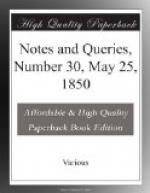Posthumous Poems p. 651.; and Ellis reprinted
it under his name. In
Cens. Lit.
ii. 102., another copy of it is given from a music
book by Gibbons, 1612. Now the longest, and
apparently the earliest of these poems is signed
‘E. DIER,’ in MS. Rawl. Poet.
35., fol. 17. That copy contains
eight
stanzas, and one of the two which are not in Byrd
corresponds with a stanza which Percy added. The
following are the reasons which incline us to trust
this MS.:—(1.) Because it is the very
MS. to which reference is commonly made for several
of Dyer’s unprinted poems, as by Dr. Bliss,
A.O. i. 743.; and apparently by Mr. Dyce, ed.
of Greene, i. p. xxxv. n.; and by Park, note on
Warton, iii. 230. Park is the only person
I can recollect who has mentioned this particular
poem in the MS., and he cannot have read more than
the first line, for he only says, ’one of
them bears the popular burden of “My mind
to me a kingdom is."’ (2.) Because it is quite
impossible that Dyer wrote many extant poems, of which
he is not known to be the author; for, as Mr.
Dyce says, none of his (
acknowledged) productions
’have descended to our times that seem to
justify the contemporary applause which he received.’
(3.) Because I cannot discover that there is any other
claimant to this poem. One of Greene’s poems
ends with the line,
‘A mind
content both crown and kingdom is.’”
(Works,
ii. 288., ed. Dyce.)
It will be observed that no mention is here made of
the copy in Breton’s tract; therefore this summary
gains from both the correspondents of “NOTES
AND QUERIES”—an addition from the
one, a corroboration from the other.
R.A.
Gesta Grayorum (No. 22. p. 351.).—“J.S.”
is informed that copies of the Gesta Grayorum
are by no means uncommon. It was originally printed
{490} for one shilling; but the bibliomaniac
must now pay from twenty to thirty shillings
for a copy. The original, printed in 1688, does
not contain the second part, which was published by
Mr. Nichols for the first time. Copies are in
the Bodleian, and in the University Library, Cambridge.
EDWARD F. RIMBAULT.
Marylebone Gardens (No. 24. p. 383.).—These
gardens were finally closed in 1777-8. It is
not generally known that, previous to the year 1737,
this “fashionable” place of amusement was
entered gratis by all ranks of people; but
the company becoming more “select,” Mr.
Gough, the proprietor, determined to charge a shilling
as entrance money, for which the party paying was
to receive an equivalent in viands.
EDWARD F. RIMBAULT.




